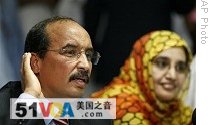Nouakchott
20 July 2009
A Former military leader, General Mohamed Ould Abdel Aziz,
 |
| Gen. Mohamed Ould Abdel Aziz, left, speaks to the press shortly after being declared the victor in the previous day's presidential election, in central Nouakchott, 19 July 2009 |
This time last year, Aziz was Chief of Staff to Mauritania's first freely-elected leader. But when President Sidi Ould Cheikh Abdallahi moved to sack Aziz last August, the general responded by taking power in a military coup that brought international sanctions and suspension from the African Union.
He refused to restore civilian leaders who he said were corrupt and weak on terrorism, because he said that would not be in the best interest of the Mauritanian people. Instead, he changed the constitution to allow military reservists to run for political office and resigned his commission to contest Saturday's presidential vote.
By winning in the first round on more than half the ballots cast, Aziz has made a swift transition from putschist to president.
The 54-year-old joined Mauritania's armed forces in 1977 with training in Morocco before setting up an elite presidential guard in Nouakchott. He was promoted to colonel after putting down an attempted coup in 2003 and an insurrection in 2004. But he helped lead a 2005 coup that brought to power his cousin, National Security Director Ely Ould Mohamed Vall.
Vall led the transition to civilian rule that elected President Abdallahi in 2007. Aziz was made a general and worked closely with the president as personal envoy to the King of Morocco and the commander of forces against militants who killed four French tourists.
But Aziz was also close to prominent businessmen and ruling-party parliamentarians - a block of whom defected to the opposition last August, leaving Abdallahi unable to govern. That is when the president moved to fire the general, and the general toppled the president.
Abdallahi was placed under house arrest, and Aziz took power as the president of an 11-member High Council of State, which said it was determined to hold new elections "as soon as possible."
Aziz ran a populist campaign, calling himself the "Candidate of the Poor" and promising to improve access to health care while lowering food and fuel prices. To the cheers of his supporters, he vowed to build more jails to imprison his political opponents, who he said were corrupt.
Sunday's victory speech was far more conciliatory.
He says he considers the other candidates in the election like all other Mauritanian citizens who have their duties and their rights. He says it is time to fight together against corruption, but that must be by legal means.
Aziz says the priority now should be focusing on health, education, and development. He says he would like to do this with the help of all Mauritanians to build a strong democracy and a modern nation with a system of social justice.
As for complaints from opposition candidates that widespread vote fraud amounts to what they call an "electoral coup d'etat," Aziz says they should take their complaints to the constitutional council.
Aziz says everyone knows this was a free and fair vote and will help to get the country out of its political crisis. Through this vote, he says Mauritania became a democratic country and the constitution will return to working democratically.